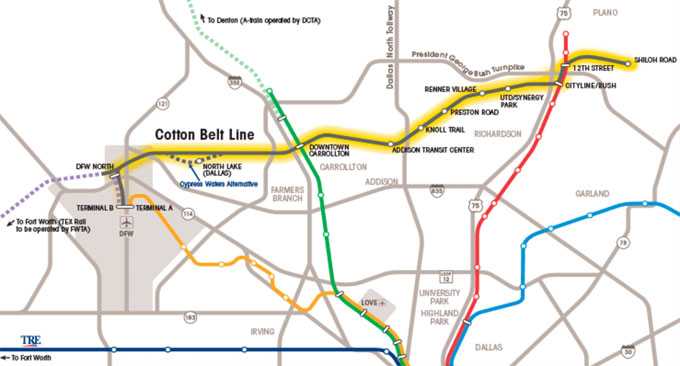In America, decisions about how to expand transit are often plagued by the same tension: The highest ridership potential is in walkable neighborhoods in the city, where more people and jobs are clustered closer together. But regional politics often lead agencies to build transit in suburban areas where ridership will be more sparse.
Right now a classic confrontation of this type is playing out in Dallas. The board of DART, the regional transit agency, recently voted to go ahead with two projects: D2 -- a subway for downtown -- and the Cotton Belt Line, a 26-mile commuter rail line through the northern suburbs that wouldn't touch central Dallas. But now that it's time to pay for the projects, each estimated to cost about $1 billion, city representatives are taking a harder look at the Cotton Belt Line.
DART board members representing Dallas aren't willing to okay funding for the Cotton Belt if it might jeopardize the subway plans, reports Julie Fancher at the Dallas Morning News:
Dallas and suburban board members are split into two camps that appear distrustful of each other and worry that one project or the other will be in jeopardy if there’s not enough money for both.
Board members voted 9-5 to allow DART to borrow for its share of the Cotton Belt, but two-thirds were needed. The five who opposed it were all Dallas appointees, including one seat shared by Dallas and Cockrell Hill.
Patrick Kennedy, a local urbanist who was recently nominated to the DART board, says DART staff believes they have the bonding capacity for both projects -- unless the Trump administration slashes funding for transit, as it has threatened to do. So that's where some of the tension is coming from. Kennedy thinks that securing funding for either project will ultimately require advancing them both.
Over at the Dallas Observer, meanwhile, columnist Jim Schutze wonders if the city wouldn't be better off blowing up DART, whose "real purpose has been to serve as an amenity and sales-pitch bauble for suburban apartment developers." Schutze points to the cold, hard truth of a system developed without prioritizing walkable access and urban neighborhoods: Ridership is low, and subsidies per passenger are high. In other words, the system that DART has built costs a lot to run but does not provide useful service.
"The best thing that could happen to the city would be for the suburbs to pull out and leave Dallas to run what’s left," Schutze writes, "or leave the whole thing high and dry and start over from scratch."
More recommended reading today: The Transportist makes the case for a 0.05 percent BAC limit for driving in the U.S., which is typical of international peers. Plan Philly takes a second to consider the role middle class neighborhoods play in supporting healthy cities and asks whether Philadelphia's remain strong. And Price Tags points to new research linking mental health and physical activity is another reason to design walkable, bikeable cities.






